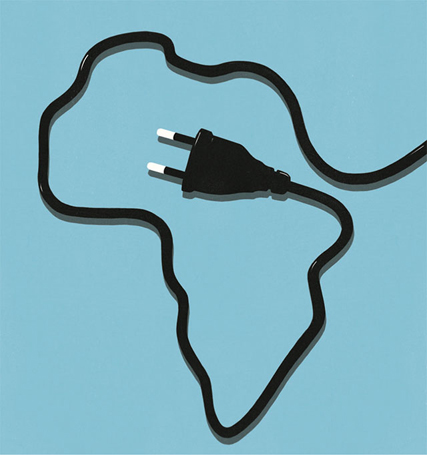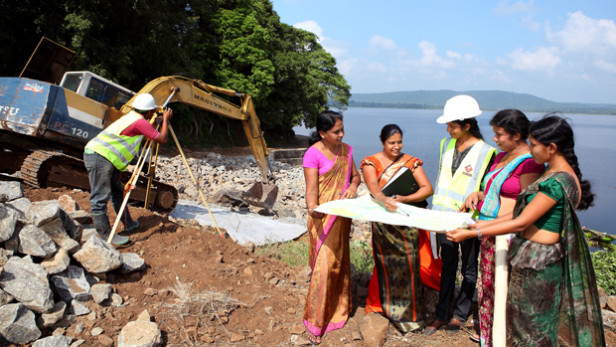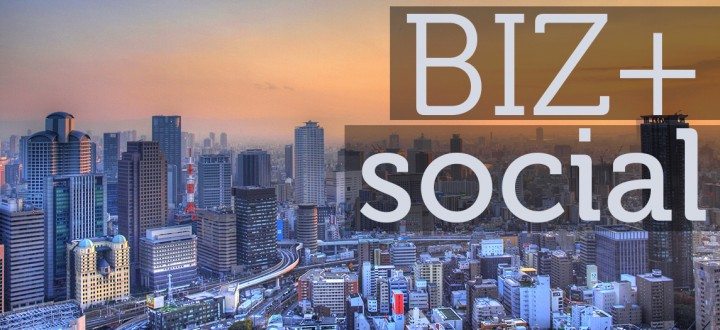WASHINGTON, DC | October 14, 2014 - This week on BIZ+SOCIAL, we bring you the best from the New Global Citizen, SSIR, Devex, and more.
GLOBAL PRO BONO
REVIEW & EXCERPT: Andrew Savitz on Talent, Transformation, and the Triple Bottom Line
Organizations are facing a daunting talent challenge. Corporations, non-profits, and governments alike are seeking to attract, develop, engage, and retain the best talent while simultaneously executing a strategy that enables them to thrive in a world with increasing global competition, resource constraints, and greater demands by all stakeholders—including employees. How organizations align their business, human resources, and sustainability strategies to better meet this challenge, is the focus of the latest book by Andrew Savitz (with Karl Weber): Talent, Transformation, and the Triple Bottom Line (Jossey-Bass, 2013). The book is a follow-up to Savitz (and Weber’s) The Triple Bottom Line: How Today’s Best-Run Companies are Achieving Economic, Social and Environmental Success – and How You Can Too (Jossey-Bass, 2006) and focuses on a group not always top of mind in sustainability discussions: human resource professionals. The book frames the global challenge and opportunity that sustainability represents, and discusses how human capital fits into the equation. Given HR’s expertise in change management, organizational culture, and organizational development, Savitz suggests that the function is well suited to play a leadership role. Read More…
IMPACT & INNOVATION
Get Rid of the Grid?
 Consider this all-too-plausible scenario: You are visiting a small rural village somewhere in sub-Saharan Africa. The sun has just disappeared behind the horizon. To your left, kids run from a dusty, makeshift soccer field toward the simple houses—most of them built of nothing but wood and soil—where they live. It is pleasant now, and you enjoy a light breeze. But just 15 minutes later, it is dark. Night has fallen, and all you hear are muffled voices and some indistinct animal sounds. You wait for the lights to go on, wait for the village to re-appear from the night, but nothing happens. In the darkness, you feel uneasy. Then, suddenly, your iPhone 5 rings. In 2005, just 5 percent of sub-Saharan Africans had a mobile telephone. In 2014, less than 10 years later, mobile network operators (MNOs) boast more than 250 million unique subscribers (30 percent of the total population), employ more than 3 million people, and generate revenues of more than $20 billion per year. Over the same period, meanwhile, the number of household electricity connections in the region has barely kept up with population growth. Indeed, only about 30 percent of the population has a connection to the electrical grid. Read more…
Consider this all-too-plausible scenario: You are visiting a small rural village somewhere in sub-Saharan Africa. The sun has just disappeared behind the horizon. To your left, kids run from a dusty, makeshift soccer field toward the simple houses—most of them built of nothing but wood and soil—where they live. It is pleasant now, and you enjoy a light breeze. But just 15 minutes later, it is dark. Night has fallen, and all you hear are muffled voices and some indistinct animal sounds. You wait for the lights to go on, wait for the village to re-appear from the night, but nothing happens. In the darkness, you feel uneasy. Then, suddenly, your iPhone 5 rings. In 2005, just 5 percent of sub-Saharan Africans had a mobile telephone. In 2014, less than 10 years later, mobile network operators (MNOs) boast more than 250 million unique subscribers (30 percent of the total population), employ more than 3 million people, and generate revenues of more than $20 billion per year. Over the same period, meanwhile, the number of household electricity connections in the region has barely kept up with population growth. Indeed, only about 30 percent of the population has a connection to the electrical grid. Read more…
LEADERSHIP
The Power of Diverse Leadership
 Despite the fact that in the United States women are earning more college degrees than men and are entering the workforce in increasing numbers, women’s representation in policymaking and elected office is dismal. According to Political Parity, women make up 19 percent of US Congress and hold only five governorships, ranking them behind Afghanistan, Ethiopia, and Nepal. Yet the US public rates women above or equal to men in traits considered crucial for leadership in policymaking areas. I believe that one of the most powerful strategies funders can pursue to advance our goals—across a spectrum of social change issues—is to invest in the leadership of people who are most affected by problems in their communities. At the Women’s Foundation of California, we have found that investment in grassroots women’s policy leadership is a core strategy for accelerating our goal to improve the lives of women and families in California. We’ve seen that when women have a voice in shaping and driving change, everyone benefits. For example, women lawmakers are more likely to prioritize families and children, and work out compromises, thereby resulting in better policy outcomes for everyone. Through our Women’s Policy Institute, a year-long fellowship program (now in its 12th year) that invests in training community-based leaders…Read More…
Despite the fact that in the United States women are earning more college degrees than men and are entering the workforce in increasing numbers, women’s representation in policymaking and elected office is dismal. According to Political Parity, women make up 19 percent of US Congress and hold only five governorships, ranking them behind Afghanistan, Ethiopia, and Nepal. Yet the US public rates women above or equal to men in traits considered crucial for leadership in policymaking areas. I believe that one of the most powerful strategies funders can pursue to advance our goals—across a spectrum of social change issues—is to invest in the leadership of people who are most affected by problems in their communities. At the Women’s Foundation of California, we have found that investment in grassroots women’s policy leadership is a core strategy for accelerating our goal to improve the lives of women and families in California. We’ve seen that when women have a voice in shaping and driving change, everyone benefits. For example, women lawmakers are more likely to prioritize families and children, and work out compromises, thereby resulting in better policy outcomes for everyone. Through our Women’s Policy Institute, a year-long fellowship program (now in its 12th year) that invests in training community-based leaders…Read More…
ENTERPRISE DEVELOPMENT
Women in the Labor Force: A Question of Quotas and Quality
 Four years ago, at the age of 28, I had a mid-life crisis. Perhaps some would say I was too young to experience such a thing, but I knew differently. I needed a change. I had been working for the past two and a half years for a large corporation in the New York City area, expanding the company’s marketing operations. During that time, I had become increasingly disillusioned with traditional corporate models. Terms like ‘sustainability,’ ‘health,’ and ‘save the environment’ were popular buzzwords in the business community, but I couldn’t help feeling that it was often more lip service than impact. Current profitability standards demand that companies prioritize maximizing shareholder profits over their potential social impact on people and communities. Companies that are most eager to embrace opportunities for visible sustainability and social impact investments are often those whose products have some negative side effect they need to mitigate. While such corporations often express interest in developing new products that could change the sustainability landscape, the default solution in the meantime often requires selling more of their existing product to drive growth. Despite the fact that I had a comfortable job, a career trajectory, and even qualified for a pension—a rarity in this day and age—I couldn’t shake the feeling that by going to work every morning I was part of the problem and not the solution. Read more…
Four years ago, at the age of 28, I had a mid-life crisis. Perhaps some would say I was too young to experience such a thing, but I knew differently. I needed a change. I had been working for the past two and a half years for a large corporation in the New York City area, expanding the company’s marketing operations. During that time, I had become increasingly disillusioned with traditional corporate models. Terms like ‘sustainability,’ ‘health,’ and ‘save the environment’ were popular buzzwords in the business community, but I couldn’t help feeling that it was often more lip service than impact. Current profitability standards demand that companies prioritize maximizing shareholder profits over their potential social impact on people and communities. Companies that are most eager to embrace opportunities for visible sustainability and social impact investments are often those whose products have some negative side effect they need to mitigate. While such corporations often express interest in developing new products that could change the sustainability landscape, the default solution in the meantime often requires selling more of their existing product to drive growth. Despite the fact that I had a comfortable job, a career trajectory, and even qualified for a pension—a rarity in this day and age—I couldn’t shake the feeling that by going to work every morning I was part of the problem and not the solution. Read more…
CITIZEN DIPLOMACY
Evolving the Handshake: Global Youth as Citizen Diplomats
 Forty-three percent of the world’s population is currently under 25—and the number of young people is rising fastest in the developing world. Today’s youth are more connected and tuned in to the world than any generation before. Youth see the challenges before them in fresh ways and are responding with enthusiasm and imagination, and have maximized cultural exchange, social media, video, and journalistic platforms for outreach and advocacy. Citizen diplomacy provides a unique opportunity for young people who often feel marginalized by decision-makers, allowing them to have a voice and forge lasting relationships with a diverse community of civic actors. Critics argue that citizen diplomats support a very narrow issue area, and have a difficult time articulating a broader catalogue of strategic foreign policy priorities.This has created tension and debate within the diplomatic community about the role of citizens in the space. But young people especially tend to be much more in tune with a broader landscape, and connect with the world in different ways. Especially in relations between developed and developing countries, the focus for young citizen diplomats has shifted from a primarily humanitarian mandate to include doing business, e-commerce, skills transfer, and sharing of solutions in sectors including health and agriculture. This concept resonates with an engagement I had with young leaders in Washington DC. Read More…
Forty-three percent of the world’s population is currently under 25—and the number of young people is rising fastest in the developing world. Today’s youth are more connected and tuned in to the world than any generation before. Youth see the challenges before them in fresh ways and are responding with enthusiasm and imagination, and have maximized cultural exchange, social media, video, and journalistic platforms for outreach and advocacy. Citizen diplomacy provides a unique opportunity for young people who often feel marginalized by decision-makers, allowing them to have a voice and forge lasting relationships with a diverse community of civic actors. Critics argue that citizen diplomats support a very narrow issue area, and have a difficult time articulating a broader catalogue of strategic foreign policy priorities.This has created tension and debate within the diplomatic community about the role of citizens in the space. But young people especially tend to be much more in tune with a broader landscape, and connect with the world in different ways. Especially in relations between developed and developing countries, the focus for young citizen diplomats has shifted from a primarily humanitarian mandate to include doing business, e-commerce, skills transfer, and sharing of solutions in sectors including health and agriculture. This concept resonates with an engagement I had with young leaders in Washington DC. Read More…
MORE
9 Ways to be a Citizen Diplomat
For Would-be ‘Integrators’: Is It Easier to Start in the Private Sector?
4 Surprising Facts About Working in Corporate Social Responsibility


